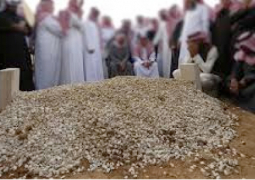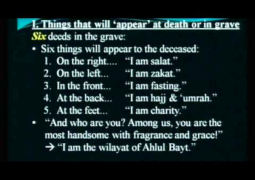Umm ‘Atiyah reported: “We were forbidden to accompany funeral processions, but this prohibition was not mandatory for us.” (Reported by Ahmad, Bukhari, Muslim & Ibn Majah) Abdullah ibn ‘Amr reported: “Once while we were with the Prophet, peace be upon him, he saw a woman - whom we thought he did not recognize - so he waited until she reached him. It was Fatimah, his daughter. He asked her: ‘What caused you to leave your house?’ She said: ‘I came to visit the family living in this house in order to offer my condolences and to comfort them in their grief.’ He said: ‘Did you accompany them to the graveyard?’ She said: ‘God forbid! How could I do that, when I know what you have said in this respect.’ The Prophet, peace be upon him, said: ‘Had you accompanied the funeral procession to the graveyard, you would never have seen Paradise, not until your grandfather’s father had seen it! (Reported by Ahmad, Al-Hakim, Nasa’i, and Baihaqi. The scholars, however, question the validity of this hadith, claiming it is not a sound hadith, because among its narrators is Rabi’ah ibn Saif, who is not trustworthy).
Muhammad ibn Al-Hanafiyyah reported that ‘Ali said: “The Prophet, peace be upon him, went out and saw a group of women sitting outside. When he asked them why they were sitting there, they told him that they were waiting for the funeral procession. He asked them: ‘Are you going to wash the body?’ They said: ‘No.’ The Prophet, peace be upon him, asked them: ‘Are you going to carry the coffin?’ They said: ‘No.’ He asked them: ‘Will you place the body in the grave?’ They said: ‘No.’ At this he said to them: ‘Then go back to your homes with your sins and without gaining any reward.” (Reported by Ibn Majah and Al-Hakim. But one of its narrators is Dinar ibn ‘Omar, who is not reliable. Abu Hatim says he is not well known, Azdi describes him as matruk (unacceptable), and Al-Khalili in his Al-Irshad calls him “a liar.”) Ibn Mas’ud, Ibn ‘Umar, Abu Amamah, ‘Aishah, Masruq, Al-Hasan, An-Nakh’i, Awza’i, Ishaq, and the Hanafi, Shafi’i and Hanbali schools hold this view. They all disapprove the participation of women in funeral processions. According to Malik, it is not disliked for an old woman to leave her home to attend a funeral. In his opinion, a young woman afflicted by the death of a dear one may also accompany a funeral procession without any disapproval, provided she is well covered and her presence does not cause any temptation.
Ibn Hazm contends that the argument put forth by the majority of scholars is not sound, and that it is permissible for women to accompany funeral processions. He said: “We do not disapprove of women attending a funeral procession, nor do we prevent them from doing so. Among the traditions reported on this subject there is no authentic hadith. There are either mursal (Mursal: Report of a successor (tab’i) directly from the Prophet without mentioning the Companion who might have heard it directly) or majhul (unknown) or such as cannot be presented as an argument.” Then he mentions the hadith by Umm ‘Atiyyah and says: “Even if it were a sound hadith it does not prove prohibition, but merely shows that it is disliked. In fact the reverse is true if we take into account the hadith narrated by Shu’bah on the authority of Waki’, who in turn narrated it from Hisham ibn ‘Urwah, who heard it from Wahab ibn Kaysan, who heard it from Muhammad ibn ‘Amr ibn ‘Ata who reported it from Abu Hurairah that once when the Prophet, peace be upon him, attended a funeral, ‘Umar saw a woman there and yelled at her. The Prophet, peace be upon him, said: “Leave her, O ‘Umar! Verily her eyes shed tears, the soul feels the pangs, and the promised hour is near.” (The chain of authorities of this hadith is sound) In a sound hadith it is reported from Ibn ‘Abbas that he did not regard it as a disliked act.
Not Attending a Funeral due to Some Forbidden Acts
The author of Al-Mughni said: “If one sees or hears something that is forbidden while attending a funeral and one is capable of countering and rectifying it, one should do so. If not, then one may do one of two things: voice his disapproval of it, and continue with the funeral which will free one from any responsibility of any such disapproved acts, without abandoning the good for the bad. The second course open to a person in such a case is to leave the funeral procession, especially when one is able to leave it, so that one’s continued participation will not lead one to hear or see a forbidden thing.”
Burial is a Collective Obligation
There is a consensus that burying a dead body and covering it is a collective obligation (Fard Kifayah). If some Muslims bury the dead body, it would absolve the rest of them from this obligation. Allah, the Almighty, says: “Have We not caused the earth to hold within itself the living and the dead?” Qur’an 77.25-26 The majority of scholars are of the opinion that it is permissible to bury the dead anytime during the day or night. The Prophet, peace be upon him, buried at night a man, who used to remember Allah aloud during the night. Similarly ‘Ali buried Fatimah at night. Abu Bakr, ‘Uthman, ‘Aishah, and Ibn Mas’ud were buried during the night as well. Ibn ‘ Abbas reported: “The Prophet, peace be upon him, went into a grave one night and was given a lamp. Then he lifted the body from the side toward the qiblah, saying: “May Allah be merciful to you. You used to cry a lot and often recited the Qur’an.” After this the Prophet, peace be upon him, said four Takbirs.”(Reported by Tirmizhi, who considers it a sound hadith) Tirmizhi said: “Most scholars consider the burial of the dead at night permissible, provided the rights of the deceased are not neglected. The same applies to offering a funeral prayer for the deceased. The Prophet, peace be upon him, commanded his followers not to bury the deceased at night if it is feared that any of his rights might be neglected. Night time burial in such a case is disliked. One day the Prophet, peace be upon him, delivered a sermon and mentioned one of his companions who had died and had been wrapped in a short shroud and buried during the night. The Prophet, peace be upon him, expressed his disapproval of burying someone at night unless one is compelled to do so. (Muslim) Jabir reported that the Prophet, peace be upon him, said: “Do not bury your dead during the night unless you are compelled to do so.” (Ibn Majah)
Burial at Sunrise, at Midday, or at Sunset
There is a consensus that a body may be buried during any of these three times whenever there is danger of it decomposing otherwise. If there is no such danger, its burial during these times is still permissible, according to the majority of scholars, provided that it is not done so on purpose, as reported by Ahmad, Muslim, and the compilers of Sunan on the authority of ‘Uqbah who said: “The Prophet, peace be upon him, forbade us from offering prayer or burying our dead at three times: at sunrise, until the sun rises high in the sky; at noon, when the sun is above one’s head until it declines a little; and when the sun begins to go down until it sets.” The Hanbali School holds that in light of the above hadith burial during these times is undesirable without exception.
Digging a Deep Grave is Desirable
The purpose of burial is to hide the body in a pit in order to prevent its stench from fouling the atmosphere, and to save it from being eaten by various beasts and birds. If these conditions are met and this purpose is served, then one has carried out one’s responsibility. It is encouraged, however, to make the depth of the grave equal to the height of an average man. This is based on a hadith reported by Nasa’i and Tirmizhi (who considers it a sound hadith) from Hisham ibn ‘Amer who said: “We complained to the Prophet, peace be upon him, on the day of the battle of Uhud, saying: ‘O Allah’s Messenger! Digging a separate grave for everybody is a very hard job.’ The Prophet, peace be upon him, said: ‘Dig, dig deeper, dig well, and bury two or three bodies in each grave.’ The Companions asked him: ‘Who should be put in the graves first?’ The Prophet, peace be upon him, said: ‘Put those most learned in the Qur’an first.’ My father, the narrator added, was the third of the three who were put in one grave.” Ibn Abi Shaibah and Ibn Al-Munzhir reported that ‘Umar said: “Dig a grave deep enough for a man’s height and make it broader.” According to Abu Hanifah and Ahmad the grave should be deep enough for half of the average height of a man, but if dug deeper, it is better.
TO BE CONTINUED



